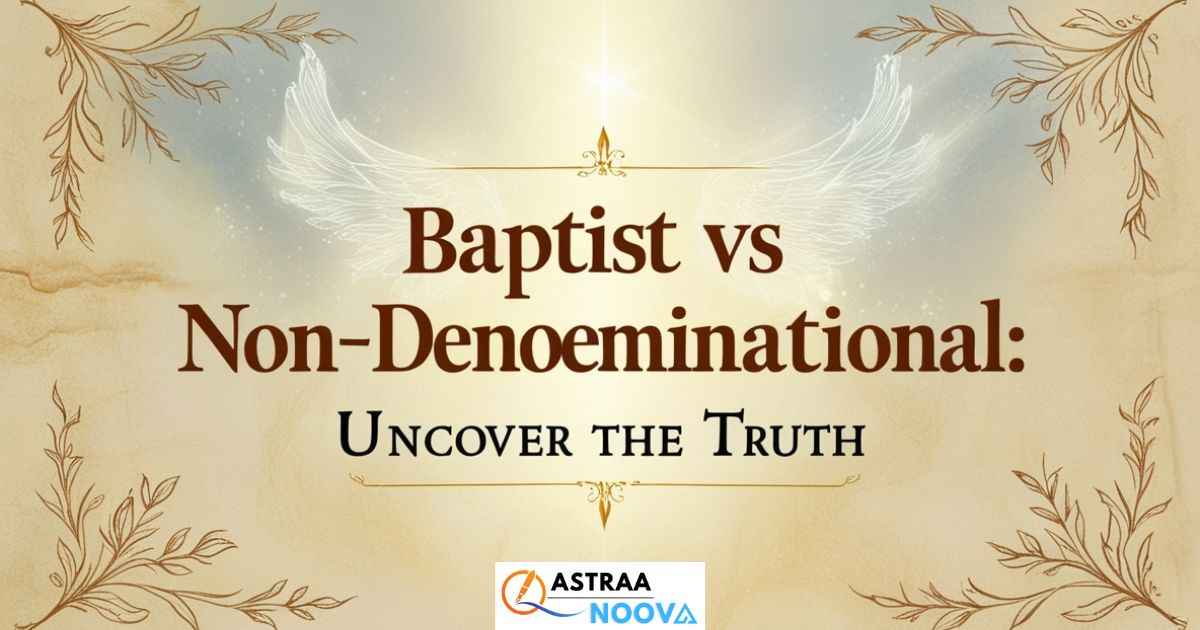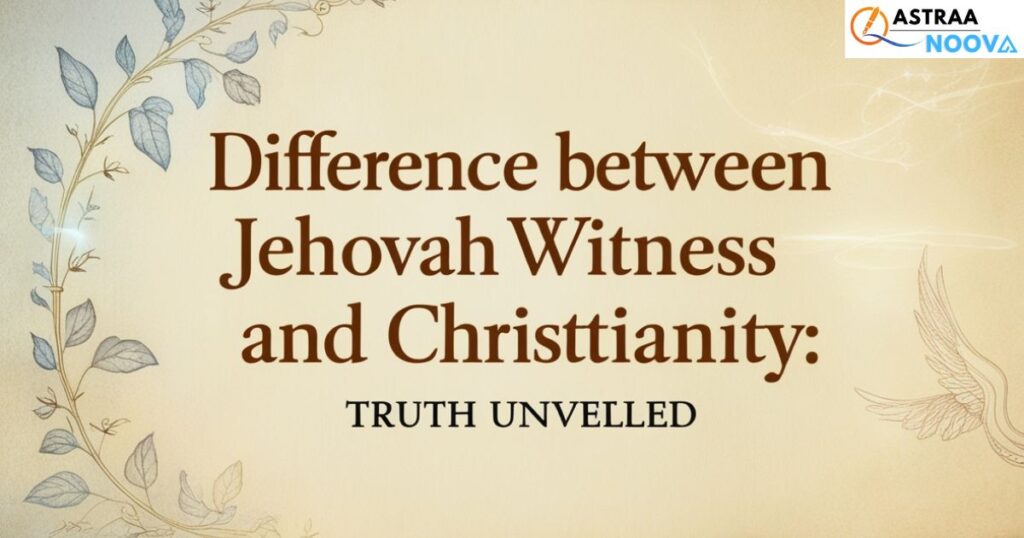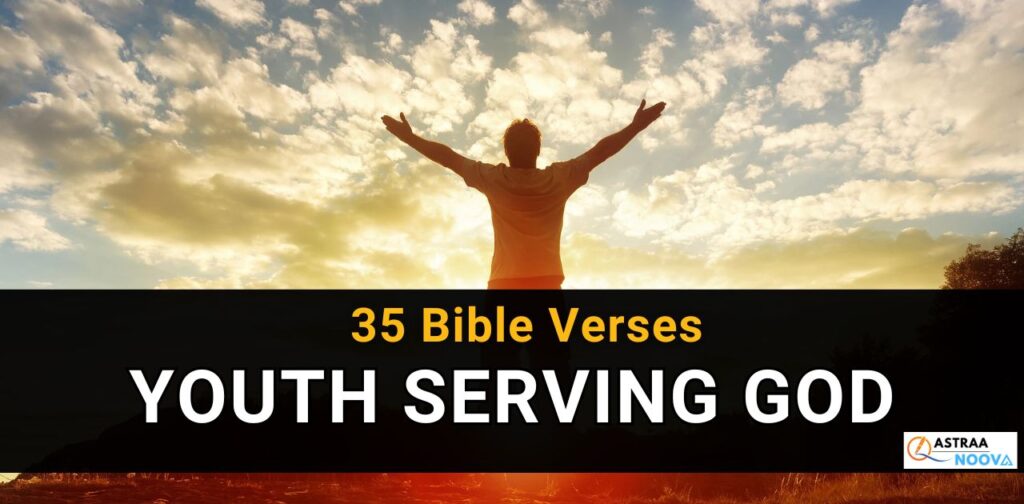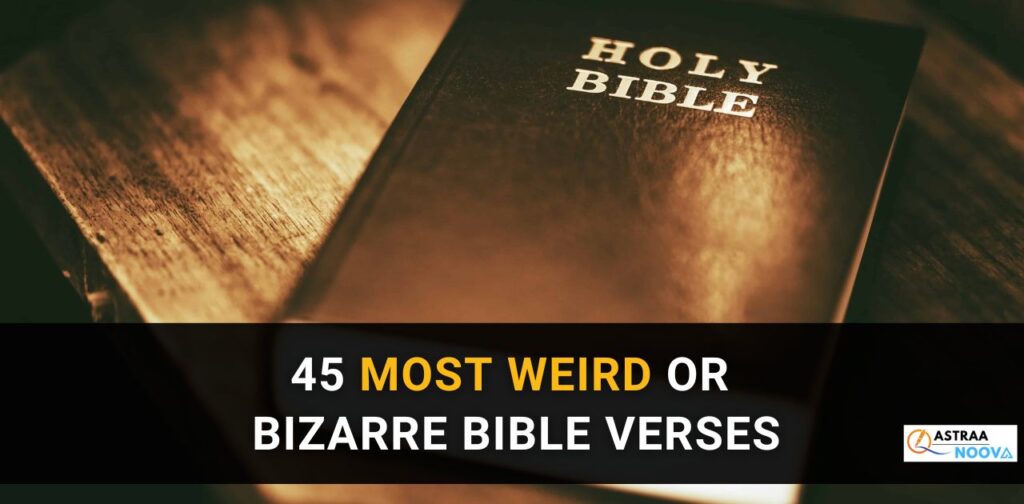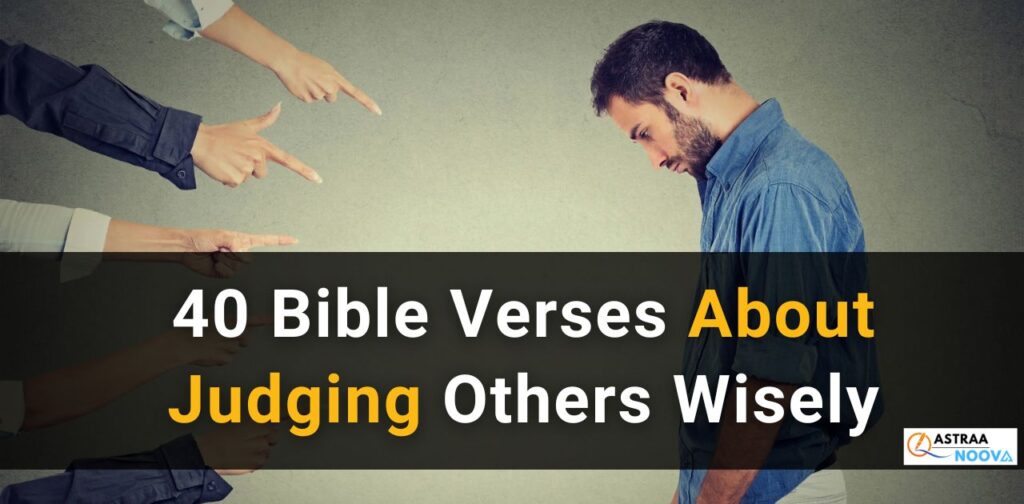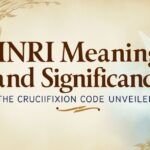Many people find themselves wondering about the distinctions between Baptist and Non-denominational churches when seeking a place of worship. These two prominent Christian traditions share core beliefs but differ significantly in their practices and approaches to faith.
Understanding these differences helps those exploring their faith journey make informed decisions about where they might feel most spiritually at home. Let’s dive deep into what makes each tradition unique while maintaining respect for both approaches to Christian worship.
What is the difference between Baptist and Non-Denominational Christian churches?
The fundamental distinction lies in their organizational structure and approach to tradition. Baptist churches belong to an established denomination with defined doctrinal positions and practices that have evolved over centuries of Christian history. These churches typically maintain strong connections with other Baptist congregations through regional and national organizations.
Non-denominational churches, by contrast, operate independently without formal ties to any specific denomination. They emphasize direct biblical interpretation and often focus on contemporary approaches to worship and ministry. This independence allows them greater flexibility in adapting to their local community’s needs.
The approach to church identity also differs significantly. Baptist churches proudly embrace their denominational heritage, including specific theological positions on baptism, church governance, and biblical interpretation. Non-denominational churches often present themselves as more accessible to people from various religious backgrounds.
What do Non-Denominational churches believe?
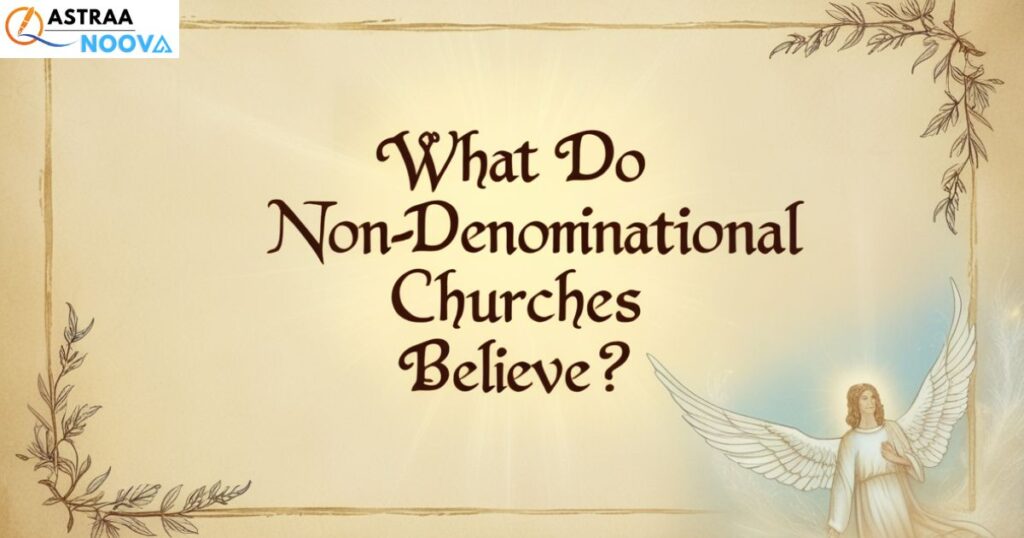
Non-denominational churches center their beliefs around core Christian principles while maintaining flexibility in secondary matters. They emphasize a personal relationship with Jesus Christ and salvation through faith, focusing on biblical teaching without rigid denominational interpretations.
These churches typically affirm fundamental Christian doctrines such as the Trinity, the deity of Christ, and the authority of Scripture. However, they may show more openness to various interpretations of non-essential doctrinal matters, allowing members to form their own informed positions on certain theological issues.
Many Non-denominational churches place strong emphasis on practical faith application. They often focus on how biblical principles relate to contemporary life, making Christianity accessible and relevant to modern believers while maintaining theological integrity.
What Bible does Non-Denominational churches use?
The choice of Bible translations in Non-denominational churches reflects their practical approach to ministry. Most commonly, these congregations use modern translations like the New International Version (NIV), English Standard Version (ESV), and New Living Translation (NLT) that balance accuracy with readability.
While Baptist churches might prefer traditional translations like the King James Version (KJV), Non-denominational churches often encourage members to use whatever translation helps them best understand God’s Word. This approach emphasizes comprehension and application over strict adherence to particular translations.
Multiple translations might be referenced during services to provide deeper understanding of Scripture passages. This inclusive approach to Bible study helps engage diverse congregations while maintaining biblical authority.
What’s the difference between Baptist and Non-Denominational worship styles?
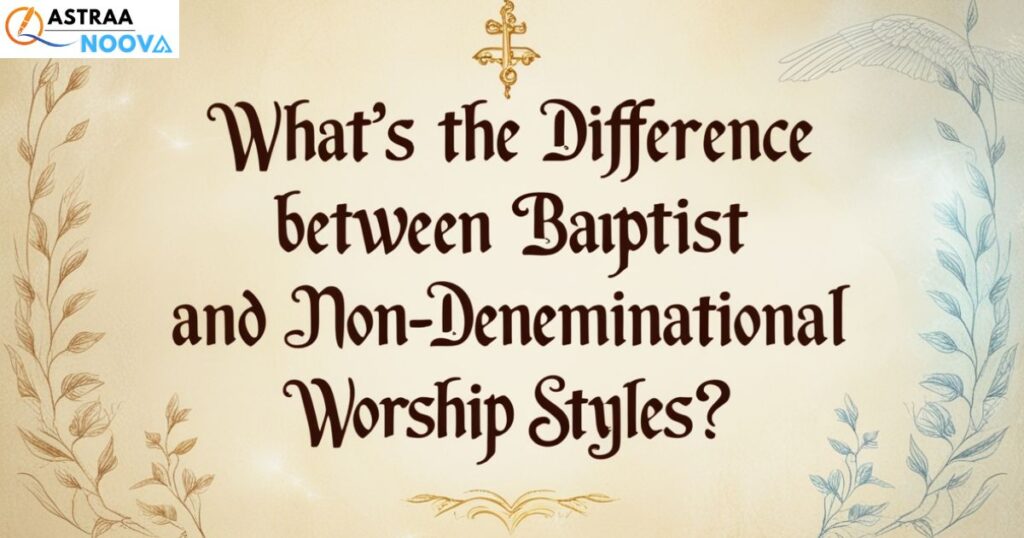
The worship experience between these traditions often shows distinct characteristics. Baptist churches typically maintain more traditional worship formats, incorporating hymns, structured prayer times, and formal presentation styles. Their services often follow an established order that congregants can anticipate each week.
Non-denominational churches generally embrace contemporary worship approaches. You’ll often find modern music with full bands, multimedia presentations, and casual atmospheres. These churches might incorporate various worship elements from different Christian traditions, creating unique and dynamic service experiences.
The physical environment also reflects these differences. Baptist sanctuaries often feature traditional church architecture with formal seating arrangements and prominent pulpits. Non-denominational churches might meet in more contemporary spaces, sometimes even in converted buildings, with flexible seating and modern technology integration.
Read Also >> Difference Between Jehovah Witness and Christianity: Truth Unveiled
How do Baptist and Non-Denominational churches view baptism?
Baptism represents a crucial distinction between these traditions. Baptist churches maintain a firm position on believer’s baptism by immersion, seeing it as a public declaration of faith that follows a personal commitment to Christ. They view this ordinance as a significant step of obedience and testimony.
Non-denominational churches often show more flexibility in their baptismal practices. While many practice believer’s baptism by immersion, some may accept other forms of baptism or recognize baptisms performed in other Christian traditions. Their focus typically centers on the spiritual significance rather than the specific method.
Both traditions emphasize baptism’s importance in Christian life, drawing from Scripture passages like Mark 16:15-16. However, they differ in how strictly they apply traditional baptismal requirements for church membership and participation in church activities.
What are the differences in governance between Baptist and Non-Denominational churches?
Decision-making process
Baptist churches typically follow a congregational governance model where major decisions require member voting. This democratic approach reflects their belief in the “priesthood of all believers” and local church autonomy. Important matters like calling pastors, approving budgets, and making significant changes involve the entire congregation.
Non-denominational churches often employ various governance models. Some operate under elder-led systems, while others might have more pastoral authority. The decision-making process usually involves leadership teams working collaboratively, though the specific structure can vary significantly between churches.
Accountability
Baptist churches maintain accountability through both internal structures and denominational connections. Regular business meetings, committee reports, and denominational oversight provide multiple layers of responsibility and transparency in church operations.
Non-denominational churches create their own accountability systems, often through boards of elders or oversight committees. While independent, many join networks or associations that provide resources and accountability without formal denominational control.
Influence of tradition
The role of tradition significantly shapes church practices. Baptist churches operate within established denominational frameworks that guide their theology, practice, and decision-making. These traditions provide stability and continuity across Baptist congregations.
Non-denominational churches often take a more flexible approach to tradition. While respecting historical Christian practices, they might more readily adapt or modify traditional elements to serve contemporary ministry needs.
What similarities exist between Baptist and Non-Denominational churches?
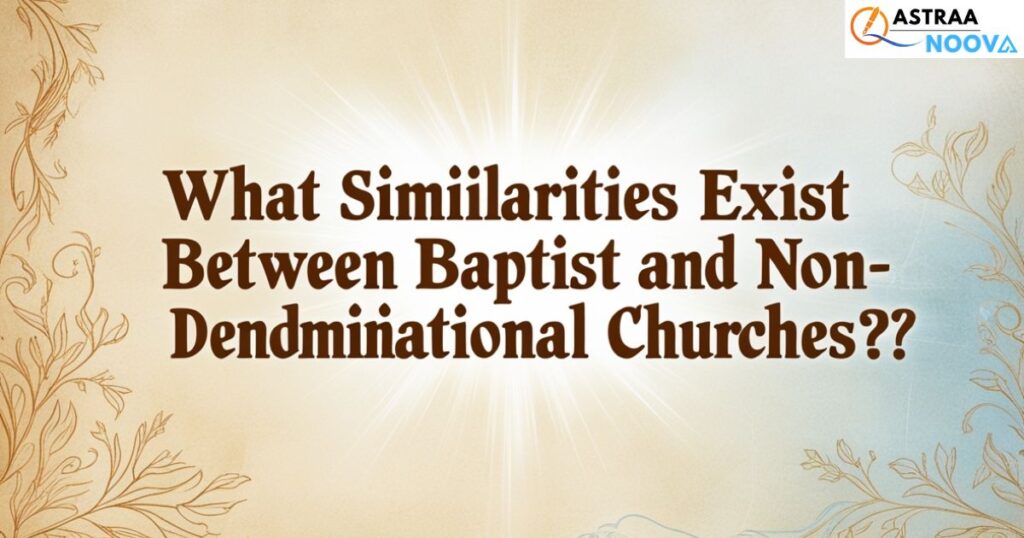
Despite their differences, both traditions share fundamental Christian beliefs. They affirm the authority of Scripture, the necessity of salvation through Jesus Christ, and the importance of sharing the Gospel. Both emphasize personal faith and spiritual growth.
Community engagement represents another common ground. Both types of churches typically maintain strong commitments to local outreach, missions, and serving their communities. They share the goal of making disciples and spreading God’s message of love and redemption.
Worship of the Trinity and recognition of Christ’s divinity unite these traditions in essential Christian doctrine. Whether through traditional or contemporary methods, both seek to honor God and build up believers in their faith.
What role does music play in worship services?
The musical approach reveals another key distinction between these traditions. Baptist churches often embrace traditional hymns accompanied by piano or organ, maintaining a reverent atmosphere that connects congregants to historical Christian worship practices. These hymns often carry deep theological meaning and doctrinal teaching.
Non-denominational churches typically feature contemporary worship bands with modern instruments. Their music selection might include both current worship songs and reimagined traditional hymns. This blend helps bridge generational gaps while creating engaging worship experiences that resonate with modern audiences.
Both traditions recognize music’s vital role in spiritual formation and corporate worship. They draw inspiration from Scripture passages like 1 Chronicles 16:23-24, which emphasizes joyful praise and declaration of God’s glory among all peoples.
How do these churches approach biblical teaching?

Baptist churches generally emphasize systematic biblical exposition, with sermons typically following verse-by-verse teaching through books of the Bible. Their approach often includes strong doctrinal elements and traditional theological interpretation backed by denominational positions.
Non-denominational churches might take a more topical approach to teaching, addressing contemporary life issues through biblical principles. While maintaining Scripture’s authority, they often focus on practical application and relevant messaging that connects with modern audiences.
Both traditions hold the Bible as their ultimate authority, drawing from passages like 2 Timothy 3:16 to affirm Scripture’s divine inspiration and practical value for teaching and spiritual growth.
Community and Outreach Approaches
Modern church ministry extends beyond Sunday services into community engagement. Baptist churches often maintain structured programs for missions, community service, and evangelism, operating within established denominational frameworks and support systems.
Non-denominational churches frequently adopt innovative outreach strategies, adapting quickly to community needs and cultural shifts. Their independent nature allows them to create unique ministry programs tailored to their specific context and audience.
Both types of churches prioritize fulfilling the Great Commission, though their methods may differ. They share a commitment to serving their communities and spreading the message of Christ’s love and salvation.
Contemporary Challenges and Adaptations
Today’s religious landscape presents unique challenges for both traditions. Baptist churches work to maintain their distinctive identity while remaining relevant to younger generations. They often carefully balance preserving traditions with incorporating contemporary elements that appeal to modern worshippers.
Non-denominational churches face the challenge of maintaining theological depth while staying accessible to newcomers. Their flexibility can be both an advantage and a challenge as they work to establish clear identity and consistent teaching.
Both types of churches navigate cultural shifts while holding firm to core Christian beliefs. They seek ways to meaningfully engage with contemporary issues while maintaining biblical integrity.
Conclusion
The journey through Baptist and Non-denominational church traditions reveals both meaningful differences and significant common ground. While their approaches to worship, governance, and practice may differ, both traditions remain committed to authentic Christian faith and ministry.
Understanding these distinctions helps individuals make informed decisions about their church involvement while appreciating the diversity within Christian expression. Whether choosing a Baptist church’s structured tradition or a Non-denominational church’s flexible approach, both offer valid paths for Christian worship and spiritual growth.
What matters most is finding a church home that supports personal faith development while maintaining biblical truth and fostering genuine community. As the body of Christ, both traditions contribute uniquely to the broader Christian landscape, each playing vital roles in contemporary Christian ministry.
Read Also >> Key Differences Between Presbyterian and Christian Beliefs Explained
FAQ’s
What is the difference between non-denominational and Baptist?
Baptist churches follow specific denominational traditions and governance structures, while non-denominational churches operate independently without formal denominational affiliations. Baptist churches typically maintain more traditional practices, while non-denominational churches often embrace contemporary approaches.
What denomination is non-denominational closest to?
Non-denominational churches don’t align with any specific denomination by definition, but they often share practices with evangelical Protestant churches. Their worship styles and teachings frequently reflect contemporary evangelical approaches while maintaining flexibility in specific doctrinal positions.
What do non-denominational Christians believe?
Non-denominational Christians hold core Christian beliefs about salvation through Jesus Christ, the authority of Scripture, and the Trinity. They typically emphasize personal relationship with God while remaining flexible on secondary theological issues.
What does it mean when someone says they are non-denominational?
When someone identifies as non-denominational, they indicate their Christian faith isn’t tied to specific denominational traditions or governance structures. They often prefer direct biblical interpretation and may draw from various Christian traditions while maintaining independence from formal denominational systems.
What Bible do Baptists prefer?
Baptist churches traditionally favor the King James Version (KJV) or New American Standard Bible (NASB), though many now use multiple translations. They typically choose translations emphasizing word-for-word accuracy from original texts.
What Bible does non-denominational use?
Non-denominational churches commonly use modern translations like the New International Version (NIV), English Standard Version (ESV), or New Living Translation (NLT). They often encourage using multiple translations to enhance understanding of Scripture.
Do Baptists believe in the Holy Spirit?
Yes, Baptists fully embrace belief in the Holy Spirit as part of the Trinity. They emphasize the Spirit’s role in conversion, spiritual growth, and guidance while typically maintaining more conservative views about charismatic expressions.
Why go to a non-denominational church?
People often choose non-denominational churches for their flexible approach to worship, emphasis on contemporary relevance, and focus on practical faith application. These churches typically offer inclusive environments welcoming people from various religious backgrounds.
Read Also >> INRI Meaning and Significance: The Crucifixion Code Unveiled

Multilingual faith educator exploring connections between language, spirituality, and dream symbolism.
